Boiled Down
Movie City News editor David Poland saw United 93 last night (I know because I saw and spoke to him at the screening), and he has asked two questions on his Hot Blog about it: What is it really about and who is it really about?
The answer to the first question isn’t that simple, but the answer to the second is as plain as a green apple sitting on a glass table in a nice restaurant in the late afternoon.
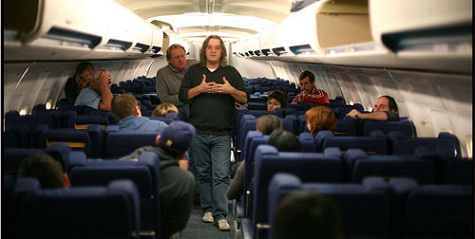
Director Paul Greengrass during filming of United 93
United 93 may have been made with the “idea” of it being about the heroism, selflessness and standing-up-to-terrorism valor shown by the passengers on flight #93, but honestly, actually…? The passengers in the film are mainly reacting to a realization that the hijackers are on a suicide mission and that they’re basically all dead, and so the bravest among them say “screw it, let’s do something instead of just waiting for it.”
This kicks in toward the very end, but the movie is really not about that (and thank God it isn’t) because, as Poland says, the drama is never delivered on any kind of individual character level. A kind of frantic heroism happened, an undeniable valor, but the film isn’t about that. Well, it is…but not finally.
< ?php include ('/home/hollyw9/public_html/wired'); ?>
Director Paul Greengrass may have begun with the idea of developing a heroism-of- the-passengers story, but I think he said along the way, “Sod it…let’s just make a minute-by-minute, you-are-there, this-is-how-it-probably-felt movie from the POV of the United #93 passengers and the perspective of the professionals charged with keeping tabs on commercial plane activity…and then we’ll sort it out in the editing room.”
And yet the movie has, ironically, a big current running through it.
This current, for me, is Greengrass’s big inspiration, his brainwave. Because it’s the first two thirds of this film — the experience and the perspective of the people trying to keep tabs on what’s happening from the air control centers — that gives United 93 its intrigue and electricity.
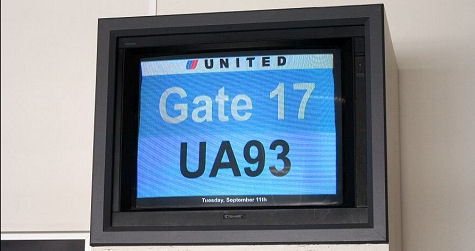
What, then, is United 93 “about”? It’s about revisiting, recapturing, reanimating… living through the particulars. Which means that Poland will be chasing his own tail around a tree trying to find the Big Meaning…unless, of course, he breaks through all that.
The theme of United 93 is the deceptive nature of “reality” as it unfolds. The reality of what life in these particular spaces felt like, and Greengrass’s striking ability to reconstitute recent history with a feeling of gripping verisimilitude, which I regard as a kind of cinematic theme or belief system in and of itself.
In short, I believe in Paul Greengrass when he’s working at the top of his form. As far as this movie is concerned, that’s my religion and my faith. Nobody needs a high falutin’ analysis about “what it’s really about” to make it feel whole or justified, because what it’s about is its own constitution. A big resounding echo isn’t the point in a film composed of a thousand echoes of minutae.
Poland also asks who is it really about?
That’s the really interesting question, and the answer is that United 93 is about us. Then and right now. Us.
Greene Grab
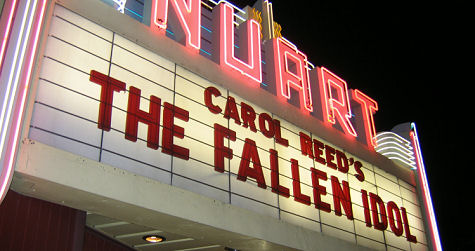
Blown Away
Is Paul Greengrass’s United 93 (Universal, 4.28) a knockout, a time-stopper, a mind-blower? It sure as hell is.
You’re probably going to need to stand outside the theatre for a few minutes after it’s over and just chill…trust me. And then you’re going to want a drink, even if you don’t drink. And then talk it out with friends for an hour or so. See it with some. Don’t go alone.
Is feeling power-drilled all over again by one of the worst real-life nightmares of all time a good thing? To me, it is.

Christian Clemenson (kneeling) as Thomas Burnett in the middle of passenger huddle during last act of United 93; Cheyenne Jackson, as Mark Bingham, is standing behind with the maroon shirt and hat.
It happened, it’s real, and this film knocks your socks off because it takes you right back to that surreal morning and that feeling, that almost-afraid-to-breathe feeling, and to me, that’s partly what good films do — they lift you out of your realm and make you forget about everything but what’s on-screen.
All I know is that I was watching and taking it all in, and that the old feelings started to build and churn around and then pour back in, like a damburst. The chills and forebodings of doom were back, and this time with a closer, more comprehensive perspective.
United 93 didn’t make me “happy” but I relished it. I’m not a baby or a coward. I’m not a “too-sooner.” Show me anything that smacks of honesty and hard truth or at least skillful manipulations of same, and I’m there for firsts, seconds and thirds.
Time‘s Richard Corliss called it “unbearable and unmissable.” Mainly the latter, I’d say. As long as it’s not a cheap-ass horror film, I eat “unbearable” for breakfast.
Not one frame of this film struck me as distasteful or exploitative. It shows what needs to be shown with as much restraint as could be managed without changing the known facts.
We were told at the screening that the print shown wasn’t quite finished. It looked pretty finished to me. No obviously raw effects, nothing that screamed out, “Oops …sorry!”
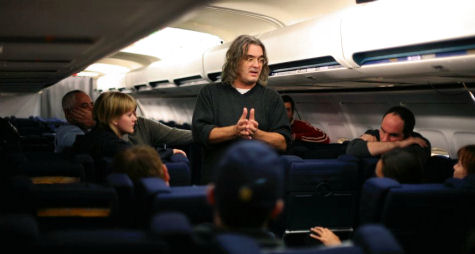
United 93 director Paul Greengrass during filming on set of Pinewood Studios.
What surprised me is that two-thirds of United 93 don’t have a whole lot to do with United #93. They’re about what happened as air traffic controllers, the FAA and the military tried to monitor what was happening with American Airlines #11, United #193 and American #77 (i.e., the flights that slammed into the North Tower, the South Tower and the Pentagon, respectively). It’s about how a lot of focused dec- ent professionals tried to keep up with the horror and couldn’t.
United 93 runs about an hour and 45 minutes. It’s about 30 minutes before Flight 93 takes off, but you’re not really paying that much attention, frankly, to those doomed souls on the plane…not at first. It’s the confused folks in the control rooms who pull you in. The second plane hits about 45 minutes in, give or take, and it’s another 15 minutes — a full hour — before the hijackers, who’ve waited and eyeball- ed each other from their first-class seats and stalled, it seems to me, like nervous nellies, before finally making their move.
For me, that opening hour is classic. Greengrass has never done anything quite as good. The tension and verisimilitude surpasses his work in Bloody Sunday, and that’s saying something. Each and every bit actor, every line…every last piece of it screws you to your seat.
Those guys playing air-traffic controllers are perfect. Remember the tension in that air-traffic controller scene in the opening moments of Close Encounters of the Third Kind? It’s that tripled or quadrupled. Ben Sliney, a gray-haired office mana- ger type who was having his first day on 9/11 as national operations manager for the FAA, plays himself. Nobody, really, seems to be “acting” in this. Every bit player rules in every control-room scene in this film.
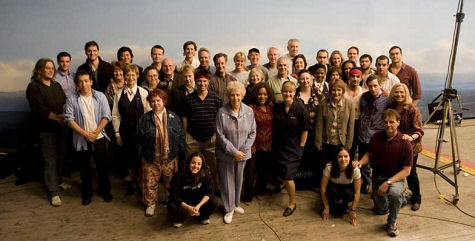
Cast of United 93 on Pinewood sound stage.
What’s so affecting is that you know what’s coming, and Greengrass just lets it come…tick, tock, tick. There’s a spellbinding moment when it all starts…when a 40ish Boston air traffic controller first realizes that American #11 is off-course and not communicating. The moment isn’t especially heightened or emphasized. It’s just this guy going, “Okay…something’s off here”
Once the hijacking on United #93 begins and the killings and screamings and all the rest of that sad melodrama kicks in, then it’s a bit more familiar, especially if you’re up on what’s known to have happened and if you saw A&E’s Flight 93 movie last January. That was an okay film. I didn’t like the family members crying and saying “I love you” to their loved ones who were calling from the plane (which felt almost icky to me), but it was all right. And yet United 93, no offense, is about two and a half to three times better.
I saw it at the first non-Time magazine press screening on Tuesday night in Santa Monica, and a woman sitting two seats away got up twice, and it’s measure of how caught up I was that I was vaguely irritated when she left the second time. How many times does this woman need to take a leak? I wondered. Or is she leaving the room to give herself a break from the tension? Either way, I was vaguely irked. (Why should I care, right? It was her business. But I didn’t want any nearby move- ment.)
The remarkable accomplishent, for me, is that I felt no sense of time while watch- ing United 93. It lasts about 105 minutes, and it could have been 40 or 50 minutes. I didn’t care, didn’t think about it. The damn thing held me, vise-gripped me. Did I have a good time? Definitely, by my standards. I haven’t sat through a pulse-poun- der like this in months, and I can’t wait to see it again.
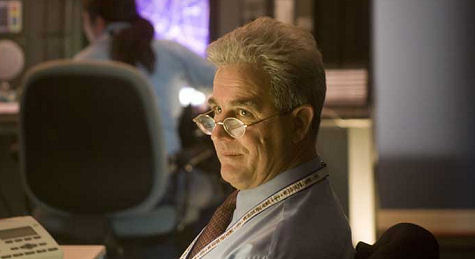
Ben Sliney, who was having his first day as national operations manager for the FAA on 9.11.01, plays himself.
Cheyenne Jackson, who plays Mark Bingham, the gay guy who died on United #93, was one of those at last night’s screening. I spoke to him briefly, told him it’s a hell of a film. He seemed kind of choked up and needed some alone time. Chris- tian Clemenson, who plays Thomas Burnett, was also there, but he was gone in a flash as soon as the credits started rolling.
One tiny beef: The last piece of copy on the black screen says that after 9/11, “America’s war on terror had begun.” The implied statement, of course, is, “And it continues today!” That it does, but if anyone thinks that what’s happening in Iraq right now (and what may even happen with Iran…who knows?) is a blow against terror they’re very much mistaken, and that final line struck me as a bit of a rah-rah statement. I think Greengrass should have just let what happened in the film (as he chose to dramatize it) stand on its own and leave well enough alone.
Puck Everlasting
The movies that seem to grab me the most are the ones that ask us to consider the mystical, the undefined, the intangibles…the ones that say “look up, look out, look beyond…there’s more to this world than what you can own, eat, taste or feel.”
The latest film to do this kind of thing well, and frankly one of the more interesting, amusing and affecting films I’ve seen over the last few weeks (if you don’t include An Inconvenient Truth, that is), is a new documentary about a bunch of guys who love to play air hockey.
It’s called Way of the Puck — and no one anywhere has seen it, except for a handful of film festival programmers. It’ll be having its world premiere at Houston’s Worldfest Film Festival in mid to late April.
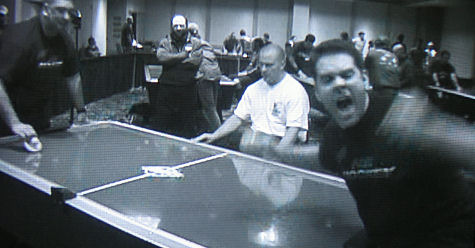
Atypical action moment in Eric D. Anderson’s Way of the Puck, meaning that 98% of it was shot in regular color video.
I’m not saying it’s wet-your-pants fantastic, but if you can imagine something as arcane as a thinking man’s air-hockey film…one that doesn’t so much focus on a stupid plastic puck getting knocked back and forth by a couple of guys leaning over a gleaming blue plastic surface as much as…well, the zen approach to this simple-ass game, keeping a light touch, concentrating hard and yet not concen- trating as much as feeling the force…this is it.
The “maker” is Eric D. Anderson, a Los Angeles-based guy who works on music videos and commercials and has spent the last two-plus years putting this doc together, partly (as you might expect) because he’s a big air hockey nut himself, but also because he sees a Great Beyond inside it…a world within a world.
“On the surface air hockey seems like a story with very low stakes,” he writes on the film’s website. “Or no stakes at all. I get a lot of this. ‘Air hockey?’ people say, nodding slowly. ‘That game from the ’70s? Hunh.’
“Air hockey isn’t the unpopular kid who gets kicked around at recess. Air hockey is the kid no one notices, including the teacher. It’s a forgotten arcade game, a kid’s game, a relic, a jobby, a diversion, a trifle…and what could be less important than that?”
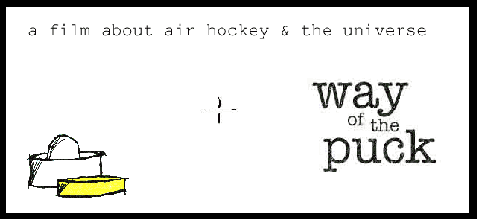
But in the making of this film, says Anderson, “I discovered a passionate and intelligent community of players. These are underdogs, participating in a fringe sport. They know they are dismissed and sometimes mocked and that air hockey will proably never be accepted by the mainstream. And yet they continue to travel thousands of miles to compete against the best players in the world.”
Way of the Puck is a guy film, mostly, obviously, but a smart one. Alert, spiritual, philosophically loaded. “Small” and a little familiar in certain ways, maybe a tiny bit repetitive (and maybe a little long…just a wee bit) but within its own territory it feels solid and connected and complete.
It’s a real middle-class film about a gaggle (somehow that word feels right rather than ‘group’) of five or six American middle class guys, most of them married and either pudgy or bearded or balding (or all three) who are serious air hockey freaks, and who all happen to be quite thoughtful and intelligent.
That’s the first big revelation — air hockey doesn’t seem to be played by meatball blue-collar types but by unusually bright and creative guys. Or so this film implies.

Eric D. Anderson
These aren’t exactly rugged individualists, but guys with a certain consistency and tenacity. Not the kind of men whom anyone would call intense or magnetic or start- ling, but men with an undeniable passion and dignity. And maybe a certain sadness or resignation thrown in, marital responsibilities and the day-to-day slog being what they are.
And yet they share an obvious, unshakable, undeniable belief in air hockey as some kind of transcendent pursuit…something that sustains their spirit, gets them through the rough patches, puts a special kind of English on their existence, makes life feel whole (or at least gives it a certain weight and dimension) and worth living.
More so from the audience perspective because air hockey isn’t that recognized or celebrated…far from it…but it’s their own thing, played as it is in those little rooms, and they’re happy with that. Or happy enough.
And there’s that cool robot. A one-armed guy resembling one of those Empire droids in Attack of the Clones playing a pretty good game of defensive air hockey with very some very fast reflexes. I’ve only seen human-sized robots with arms and legs do things like walk dogs and vacuum rugs. This guy’s different. Impressive.

Robot air hockey
The point of Way of the Puck is that an air-hockey player needs to be alive and alert and in touch with something inward and flowing to get anything out of the game. More than just a fast hand and a light touch, but man…that robot.
Anderson believes that air hockey is “the culmination of 2500 years of human thought — connected to astronomy and artificial intelligence, music and missiles, comics and country + western dancing, painting and punk rock.” I don’t know if I can go that far, but Way of the Puck convinced me that air hockey amounts to something, or at least the players do.
Memory Lane
April has barely begun and the media drumbeat over the year’s two big 9/11 films, both produced with the upcoming five-year anniversary in mind, is already pretty loud.
Press screenings for United 93 are beginning this week, stories attempting to gauge the public’s interest in seeing this and other 9/11 presentations are running (the Wall Street Journal and Newsweek ran theirs on 4.7 and 4.10, respectively), and we’ll be hearing more and more about Oliver Stone’s World Trade Center next month when a 20-minute reel from the 8.11 Paramount release is shown at the Cannes Film Festival.

Nicolas Cage as Sgt. John McLouglin in Oliver Stone’s World Trade Center (Paramount, 8.11)
The 9/11 anniversary isn’t for another five months, of course, but I’ve been thinking about another startling event that happened in Manhattan nearly five years ago — a panel discussion on Saturday, October 6, 2001, at Alice Tully Hall called “Making Movies That Matter: The Role of Film in the National Debate.”
I reported on this right after it happened and I’ve mentioned it since (most recently in a WIRED item around noon on Sunday, 4.9), so why dredge it up for the third or fourth time? Because what panelist Oliver Stone said that day is, to me, still bang -on-the-head thrilling, and I’ve been wondering what’s changed in the four and a half years since…if anything?
It’s Sunday, it’s sunny outside, birds are chirping and I’m just going to run this piece again. (Most of it.) It’s a portrait of what’s been happening in this town for a long time, but the precision and candor in Stone’s rant still resonates.
Stone tried to describe the mindset and inclinations of corporate-run Hollywood as he saw it back then. Has the situation abated, remained the same, gotten worse or what? Read this through and think about it. I’m asking.
I’m repeating what I said in the WIRED item, but this sure was a long time ago, especially considering the apparent repositioning that has happened inside Stone himself, who was obviously more than a bit of a firebrand on 10.6.01 and now look at him, the director of a 9/11 pic about a couple of Port Authority guys who got buried under the fallen towers…a film that’s starting to sound, frankly, like it may be a head-in-the-sand emotional comfort blanket disguised as a rescue thriller.
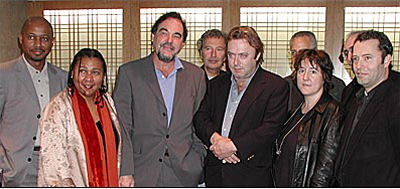
Before the ’01 debate: Lumumba director Raoul Peck, essayist Bell Hicks, director Oliver Stone, New Line Cinema honcho Robert Shaye, political writer Christopher Hitchens, former Universal Pictures chairman Tom Pollock, indie producer Christine Vachon (Boys Don’t Cry, Storytelling), former Universal Pictuers chairman Tom Pollock (almost completely hidden), and HBO executive Colin Callender.
I’m not saying World Trade Center won’t be a well-crafted or emotionally affecting drama. (Alexander aside, Stone is still a top-notch filmmaker). And who knows? Maybe it will contain echos and undercurrents that will add dimension to what screenwriter Andrea Berloff believes it is (“a boy-down-a-well saga’). But read the following and tell me Stone hasn’t trimmed his sails just a tad.
“Say what you will about Oliver Stone’s political views, but he’s a master at whipping up a crowd,” I began. “This was plainly evident during a panel discussion he participated in last Saturday at New York’s Alice Tully Hall called ‘Making Movies That Matter: The Role of Film in the National Debate.’
“The same brio that has enlivened many of Stone’s politically driven films, including JFK, Born on the Fourth of July, Platoon, and Nixon, was in full force during the sometimes brawl-like, HBO-sponsored discussion.
“Stone’s chief nemesis during the discussion — which also included some volleys from from political writer Christopher Hitchens, former Universal Pictures chairman Tom Pollock, indie producer Christine Vachon (Boys Don’t Cry, Storytelling), Lumumba director Raoul Peck, and political essayist Bell Hooks — was New Line Cinema chairman and CEO Robert Shaye.
“It fell to Shaye to articulate the status-quo views of corporate Hollywood, which elicited not only the wrath of Oliver but occasional groans from the audience. Much of what Shaye said was fair and sensible, but it was no match for the sweep of Stone’s oratory, which occasionally vaulted past the concerns of the entertainment industry to include speculation on the whys and wherefores of the 9/11 disaster.
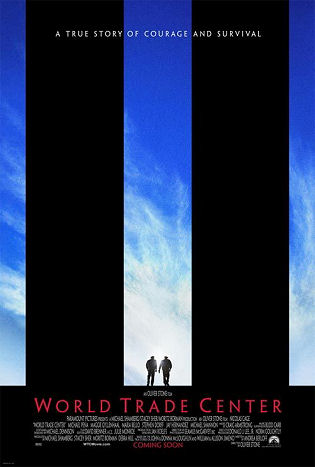
“The central issue was whether Hollywood’s increasing reluctance to finance films with a strong political undercurrent (particularly in the wake of the World Trade Center attack) was being caused by a corporate-driven aversion to anything that isn’t essentially banal or superficial, as Stone asserted, or whether the main impediment to the funding of risky and/or controversial films is ‘the tyranny of talent,’ as Shaye put it, referring to astronomical fees demanded by actors and certain high-profile directors.
“Stone launched into one of his hardest-hitting points by recalling the relatively modest financing that gave birth to Born on the Fourth of July, his Oscar-winning 1989 drama about Vietnam veteran Ron Kovic that starred Tom Cruise.
“‘We struggled to make it,’ said Stone. ‘We had fights. The picture cost $16 million, and then it went to $17 or $18 million, and we fought for that extra two million like crazy.
“‘But this was 1989 — and there’s been no significant inflation in the United States since then,’ he continued. ‘Why, in 2001, does a picture that was done very tightly in 1989…[would] that picture today cost $60 to $80 million? With the marketing costs added in, which are inflated, putting it into the $90s…advertising and television…we’re talking a $100 to $135 million event.
“‘This would no longer be a movie, but an event. And someone like Tom Pollock would say…’Born on the Fourth of July? I’m not going to make that for $130 million!’ Because [this kind of film] can’t work any more in a system that has gone bananas .’

Lincoln Center’s Alice Tully Hall
“Stone was greeted by a passionate, sustained round of applause. Who doesn’t feel that films like Born on the Fourth of July, for which Stone won a Best Director Oscar and Cruise was nominated as Best Actor, are in woefully short supply these days?
“‘And this ties in to the Arab situation,’ Stone went on. ‘Why have we gone, in a non-inflationary era, to a [place] where our corporations have become huge over the last 10, 12 years? We’ve let them go. There’s been no trust-buster around. Teddy Roosevelt is long dead. And these media corporations have conglomerated themselves into six principal fiefdoms run by barons…they’re bigger than barons. They’re kings.’
“Stone was referring to Sumner Redstone who runs Viacom, which owns Paramount; Barry Meyer of Time-Warner, which owns Warner Bros. and New Line Cinema; Rupert Murdoch of Fox Newscorp., which runs 20th Century Fox; Mel Harris of Sony Pictures; Michael Eisner, the chairman/CEO of the Walt Disney Company; and Jean-Marie Messier of Vivendi, which owns Universal Pictures.”
[Note: Today’s media barons are Viacom’s Redstone, Newscorp’s Murdoch, Richard D. Parsons of Time-Warner, Sony Corp.’s chairman and CEO Howard Stringer, Disney CEO Bob Iger and Jeffrey R. Immelt, CEO of General Electric, which owns NBC Universal.]
“And these six companies decide,” said Stone. “Rupert Murdoch says ‘I would not make JFK,’ or Mike Eisner says ‘I would not do a film on Martin Luther King, Oliver, [because] there’s gonna be rioting at the gates of Disneyland’…you know, this is bullshit!”
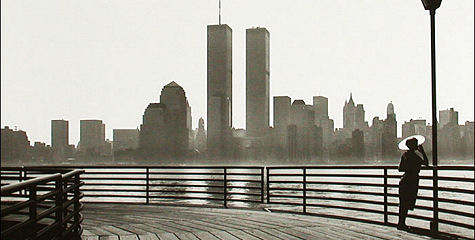
“Gales of applause greeted this one, with some scattered yelps and cries of ‘right on!’
“‘These six people have control of the world and that’s what the new world order is,’ he explained. ‘Six men are deciding what you’re seeing in film, and they own all the small companies…it’s hard to find one that’s not owned by one of these huge companies buying new companies, so it’s a dilemma. There’s a control of culture, ideas, everything.
“Now, within reason, they let [filmmakers] do certain things, and that is far better obviously than, say, the Arabs where they don’t let you do anything, and I agree it’s relative. But we are in a dilemma. We have too much order.”
“‘And I think the revolt on September 11 was about order,’ Stone went on. “It was about fuck you, fuck your order…it was an eruption of rage about this. And is it time perhaps to reconsider the world order? Is it time to wonder why the banks have joined the movie companies and all the corporations, and where this is all going?”
“Hitchens, who writes for The Nation and Vanity Fair , bridled at the use of the term ‘revolt’ and said the September 11 massacre ‘was not a revolt. It was a state-supported mass murder using civilians as missiles. It was an attack on civil society and civilization.’ This drew vigorous applause, albeit slightly more subdued.
“Shaye said, ‘I disagree with Oliver about this. I think he’s talking about an era and the studio system of 30 years ago. I will tell you, and Tom Pollock will back me up on this, that this is a tyranny of talent right now, and I don’t know what Oliver gets for directing a film, but I know what a lot of other people get, and it’s way too much. I do know that the last guys to get paid, believe it or not, are the studios that put up the money, and…’
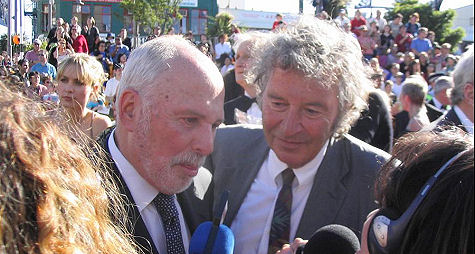
Robert Shaye (r.), co-chairman and co-CEO of New Line Cinema (pictured with Michael Lynne (l.)
“At this last remark, Stone shuddered and flopped back in his chair and looked up at the ceiling as if to say, ‘Did he just say that? I give up!’ Torrents of laughter. The hall was jumping.
“‘And if there’s a tyranny, it’s a tyranny of talent,’ Shaye concluded, drawing muted sneers and guffaws.
“Pollock, who was running Universal’s movie division when Born on the Fourth of July got made, said the go-ahead happened ‘because Oliver Stone was willing to make it for no money, and Tom Cruise was willing to make it for no money. The film was successful, they made a lot of money, and so did Universal, but it would not have been made had they not done that.
“‘Controversial films can still get made,’ said Pollock, ‘but films cost what they cost because most of the people who make them want to get paid as much as they can. They want control, but there is still that trade-off of money for control. We are in an oligarchy now where the large companies control what we see…yes, Rupert Murdoch has a political agenda, but by and large Rupert Murdoch is only interested in money.
“‘The problem with the six guys running the six companies is, they want to take no risks at all,’ he concluded. ‘They want movies that entertain only, if they can be marketed. There was little room before September 11 to make political movies inside the system. There’s less room now. It isn’t that it’s not going to happen. But it is going to be harder. And to that extent, Oliver is right.’
“Shaye said that New Line Cinema ‘started out in my apartment on 14th Street. We made our way in the world. We started out with Sympathy for the Devil. Talk about political…give me a break. And you know why it made money? Because the Rolling Stones were in it, not because Jean-Luc Godard had anything particularly profound to tell the world.’ Random hoots and snorts greeted this one.
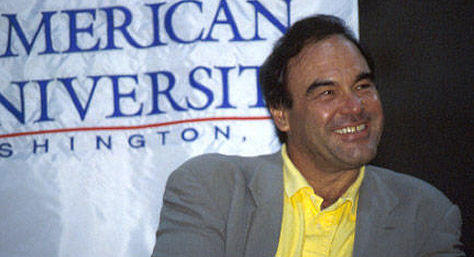
“‘It’s a little disenchanting,’ Shaye continued. ‘The truth of the matter now is, right now, that with high-definition and video and stuff like that you can make a good movie for not very much money. The great thing about the entertainment business and the movie business is that when a movie’s good, you attract people. People talk about it, the whole word-of-mouth thing…the quality of a movie is a self-fulfilling mechanism.”
“Stone jumped back in. ‘Thirty years ago, Bob said before. That’s when he got started. It was all…it was another world. [But] nobody here has answered that question why, between ’89 and 2001, everything has become so uniform…what’s basically happened in the last 10 years is that the studios have bought television stations. And why?’
“Referring to the so-called ‘syn-fin’ legislation passed under the Clinton administration a couple of years ago that allowed studios to own more TV stations, Stone asked, ‘Why did that telecommunications bill get passed at midnight? It was basically a division of the world by a few media moguls and it was a giveaway and it was done at midnight and it’s a disgusting thing. To own TV stations is the basis upon which movie companies today have to exist. And that’s changed everything. There are only so many television stations. Each one has their big build-up and that’s their base of operation.
“‘And Bob [Shaye] knows it because he sold his little movie company to Warner Bros. for more money than I could ever dream of making,” Stone continued. He acknowledged that certain high-profile directors, such as himself, are well paid for helming big-studio films. But the majors these days “don’t need a top director, they feel. Just make the movie. Because for them it’s all about marketing and about subject. That’s what they think.
“‘So there’s no ‘left’ point of view. It’s not financially interesting for them to make a movie with a director who costs more money…they’d rather go with a marginal director. It’s all about product…movie product…and it’s all about this new world order.

“‘And the Arabs have a point. Whether it’s right or wrong, there’s an objection to the way the world is going. There’s a lot of hate and revolt in that state. It may continue and although the shoe may drop on the other foot the next time, the point is they’re objecting to something. And I say that we’re not dealing with that objection on this stage today. There was a breakdown in the ’90s, in the system, the world system, the world banking system…it’s the new world order, and it’s about order and control, but this control comes with a cost.
“‘One of the most banal ways for censorship to operate in America,’ Stone continued, ‘is to drive out thought by explosions of People magazines and celebrity culture and…our culture is focused on Sarah Jessica Parker and kind-of inane, superficial stuff…it just becomes the noise, the white noise of our society.”
“Turning to Pollock, Stone said, ‘I don’t want to pick on you, Tom, but you’re ignoring the banks, you’re ignoring television, you’re ignoring the size of this thing, and you’re saying this thing is okay because that’s the way of the world because capitalism will go that way.
“‘The so-called ways of capitalism are not inevitable,’ Stone exclaimed. ‘It’s changed historically. Teddy Roosevelt changed the direction of it. Franklin Roosevelt changed the direction of it. Everybody in Hollywood says, ‘Well, what can I do about it?” These six companies have taken over just like the oil companies, and it’s wrong, wrong, wrong because they’re subverting political will.'”
Ales & Stouts















